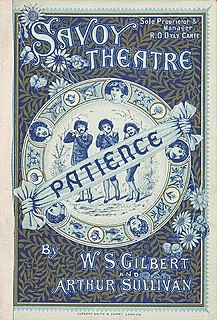
Savoy opera was a style of comic opera that developed in Victorian England in the late 19th century, with W. S. Gilbert and Arthur Sullivan as the original and most successful practitioners. The name is derived from the Savoy Theatre, which impresario Richard D'Oyly Carte built to house the Gilbert and Sullivan pieces, and later those by other composer–librettist teams. The great bulk of the non-G&S Savoy Operas either failed to achieve a foothold in the standard repertory, or have faded over the years, leaving the term "Savoy Opera" as practically synonymous with Gilbert and Sullivan. The Savoy operas were seminal influences on the creation of the modern musical.

Utopia, Limited; or, The Flowers of Progress, is a Savoy opera, with music by Arthur Sullivan and libretto by W. S. Gilbert. It was the second-to-last of Gilbert and Sullivan's fourteen collaborations, premiering on 7 October 1893 for a run of 245 performances. It did not achieve the success of most of their earlier productions.
Harry Greenbank was an English author and dramatist best known for contributing lyrics to the successful series musicals produced at Daly's Theatre by George Edwardes in the 1890s.
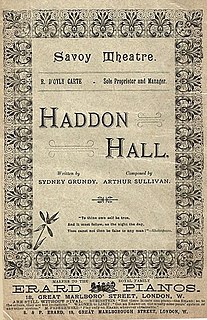
Haddon Hall is an English light opera with music by Arthur Sullivan and a libretto by Sydney Grundy. The opera, set at the eponymous hall, dramatises the legend of Dorothy Vernon's elopement with John Manners, resetting the tale in the 17th century.

Rutland Barrington was an English singer, actor, comedian and Edwardian musical comedy star. Best remembered for originating the lyric baritone roles in the Gilbert and Sullivan operas from 1877 to 1896, his performing career spanned more than four decades. He also wrote at least a dozen works for the stage.

Rosina Brandram was an English opera singer and actress primarily known for creating many of the contralto roles in the Savoy operas with the D'Oyly Carte Opera Company.
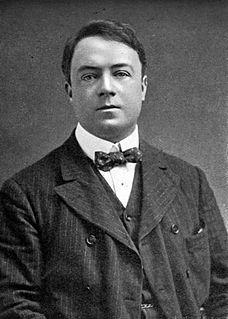
Charles Courtice Pounds, better known by the stage name Courtice Pounds, was an English singer and actor known for his performances in the tenor roles of the Savoy Operas with the D'Oyly Carte Opera Company and his later roles in Shakespeare plays and Edwardian musical comedies.

François Arsène Cellier, often called Frank, was an English conductor and composer. He is known for his tenure as musical director and conductor of the D'Oyly Carte Opera Company during the original runs and early revivals of the Savoy operas.

Robert Evett was an English singer, actor, theatre manager and producer. He was best known as a leading man in Edwardian musical comedies and later managed the George Edwardes theatrical empire.
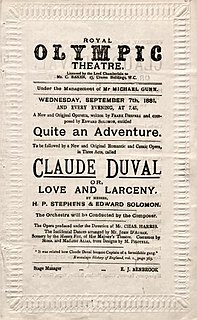
Quite an Adventure is a one-act comic opera by Edward Solomon with a libretto by Frank Desprez. The farcical plot concerns a house-guest who mistakes his hostess's husband for an intruder.

Old Sarah is a one-act comic opera composed by François Cellier with a libretto by Harry Greenbank.
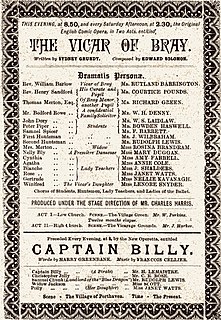
Captain Billy is a one-act comic opera with a libretto by Harry Greenbank and music by François Cellier. It was first performed at the Savoy Theatre on 24 September 1891 until 16 January 1892, as a curtain raiser to The Nautch Girl, and from 1 February 1892 to 18 June 1892, as a curtain raiser to The Vicar of Bray, for a total of 217 performances.

The Vicar of Bray is a comic opera by Edward Solomon with a libretto by Sydney Grundy which opened at the Globe Theatre, in London, on 22 July 1882, for a run of only 69 performances. The public was not amused at a clergyman's being made the subject of ridicule, and the opera was regarded by some as scandalous. An 1892 revival at the Savoy Theatre was more successful, lasting for 143 performances, after public perceptions had changed.

Jane Annie, or The Good Conduct Prize is a comic opera written in 1893 by J. M. Barrie and Arthur Conan Doyle, with music by Ernest Ford, a conductor and occasional composer.
Florence Easton was a British singer and actress who sang with the D'Oyly Carte Opera Company in the early 1890s.

Emily Owen was an English opera singer and actress, best known for her performances in soprano roles of the Savoy Operas with the D'Oyly Carte Opera Company. Beginning as a child actress, she performed for two decades before falling ill on tour and dying at age 33.

Albert Ernest Alsor Clair Ford was an English composer of operas and ballet music and a conductor.
Pretty Polly is a one-act playlet by Basil Hood, with music composed by François Cellier. The ten-minute long piece concerns the difficulties of a shy fellow who tries to use a talking parrot as a matrimonial agent.

Jessie Kate Rose was an English opera singer and actress primarily known for her performances as principal mezzo-soprano in the Gilbert and Sullivan comic operas with the D'Oyly Carte Opera Company. From 1896 to 1899 she originated several mostly smaller roles in Savoy operas and then continued to play a variety of smaller and larger roles in repertory with the company. She was its principal mezzo-soprano from 1904 to 1909.

Rudolph Lewis was a bass-baritone known for creating several small roles in the Gilbert and Sullivan operas including Go-To in The Mikado (1885) and Old Adam Goodheart in Ruddigore (1887).

















